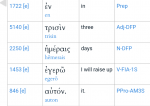E
Regarding Psalm 119; you both may find the following interesting...it's something I'm still exploring...
All scripture must harmonize, and scripture says Christ has no sin, but clearly, portions of the passage apply to Christ. Consider these points:
- Moses was commanded to craft the mercy seat into two cherubs made from a single piece of beaten gold, "according to the pattern" Moses was given. Exodus 25:18
- On the day of atonement, cleansing blood was to be sprinkled on the east end of the mercy seat (i.e., the left hand when looking at it from our perspective), and never on the west end (i.e., the right hand from our perspective), and also in front of the mercy seat. Leviticus 16. The front being sprinkled is easy enough to understand (we come kneeling before the throne of mercy). The west end // righthand makes sense too (Christ ascended to the right hand of the Father, so He wouldn't need cleansing blood). But the lefthand...
- The ritual also details two goats, one killed and the other left to go free.
- Then we are told in Romans 3:25 that Christ is the mercy seat (some versions say "propitiation"). So the literal fulfillment of the image given to Moses.
- Revelation 3:21 says He that overcomes will be granted by Christ to sit with Him on His throne as He sits on His Father's throne. Together they will rule the nations.
- Hebrews 9:5 says that there's more to delve into with regard to the imagery of the two Cherubs but such wasn't to be discussed at the time.
- Finally, we have imagery during the gospels of Christ and Barabas being presented together for judgment, where the guilty went free while the innocent paid the price. Many older copies of the passage noted that Barabas' full name was "Jesus Barabas".
----
Twin Cherub mercy seat...twin goats...two men named "Jesus"...
So it's likely that we weren't meant to attribute all of Psalms 119 to Christ, but neither are we to negate the passage from Him simply because it mentioned sin. Part of it applies to Him and part of it applies to those in Him whom He cleanses...and they are One by Faith. (i.e., a single piece of beaten gold).
All scripture must harmonize, and scripture says Christ has no sin, but clearly, portions of the passage apply to Christ. Consider these points:
- Moses was commanded to craft the mercy seat into two cherubs made from a single piece of beaten gold, "according to the pattern" Moses was given. Exodus 25:18
- On the day of atonement, cleansing blood was to be sprinkled on the east end of the mercy seat (i.e., the left hand when looking at it from our perspective), and never on the west end (i.e., the right hand from our perspective), and also in front of the mercy seat. Leviticus 16. The front being sprinkled is easy enough to understand (we come kneeling before the throne of mercy). The west end // righthand makes sense too (Christ ascended to the right hand of the Father, so He wouldn't need cleansing blood). But the lefthand...
- The ritual also details two goats, one killed and the other left to go free.
- Then we are told in Romans 3:25 that Christ is the mercy seat (some versions say "propitiation"). So the literal fulfillment of the image given to Moses.
- Revelation 3:21 says He that overcomes will be granted by Christ to sit with Him on His throne as He sits on His Father's throne. Together they will rule the nations.
- Hebrews 9:5 says that there's more to delve into with regard to the imagery of the two Cherubs but such wasn't to be discussed at the time.
- Finally, we have imagery during the gospels of Christ and Barabas being presented together for judgment, where the guilty went free while the innocent paid the price. Many older copies of the passage noted that Barabas' full name was "Jesus Barabas".
----
Twin Cherub mercy seat...twin goats...two men named "Jesus"...
So it's likely that we weren't meant to attribute all of Psalms 119 to Christ, but neither are we to negate the passage from Him simply because it mentioned sin. Part of it applies to Him and part of it applies to those in Him whom He cleanses...and they are One by Faith. (i.e., a single piece of beaten gold).
There are 2 mistranslations in verse 67 and verse 176 that people claim was an admission of going astray. those are total mistranslations and no admission of any guilt. in fact if you look at the verses preceding and following those verses He is proclaiming His obedience and blamelessness. In the last stanza He was dead following the cross so He had fully obeyed the law at that point by offering His life to save us.
Psalm 119 is the Son's prayer from the first stanza to the last entirely. anyone who thinks otherwise is mistaken by some poor translations. those have already been addressed multiple times in this thread and others but some will not study the Hebrew to confirm what was explained. Psalm 119 is the Son's prayer for life and to be raised.

